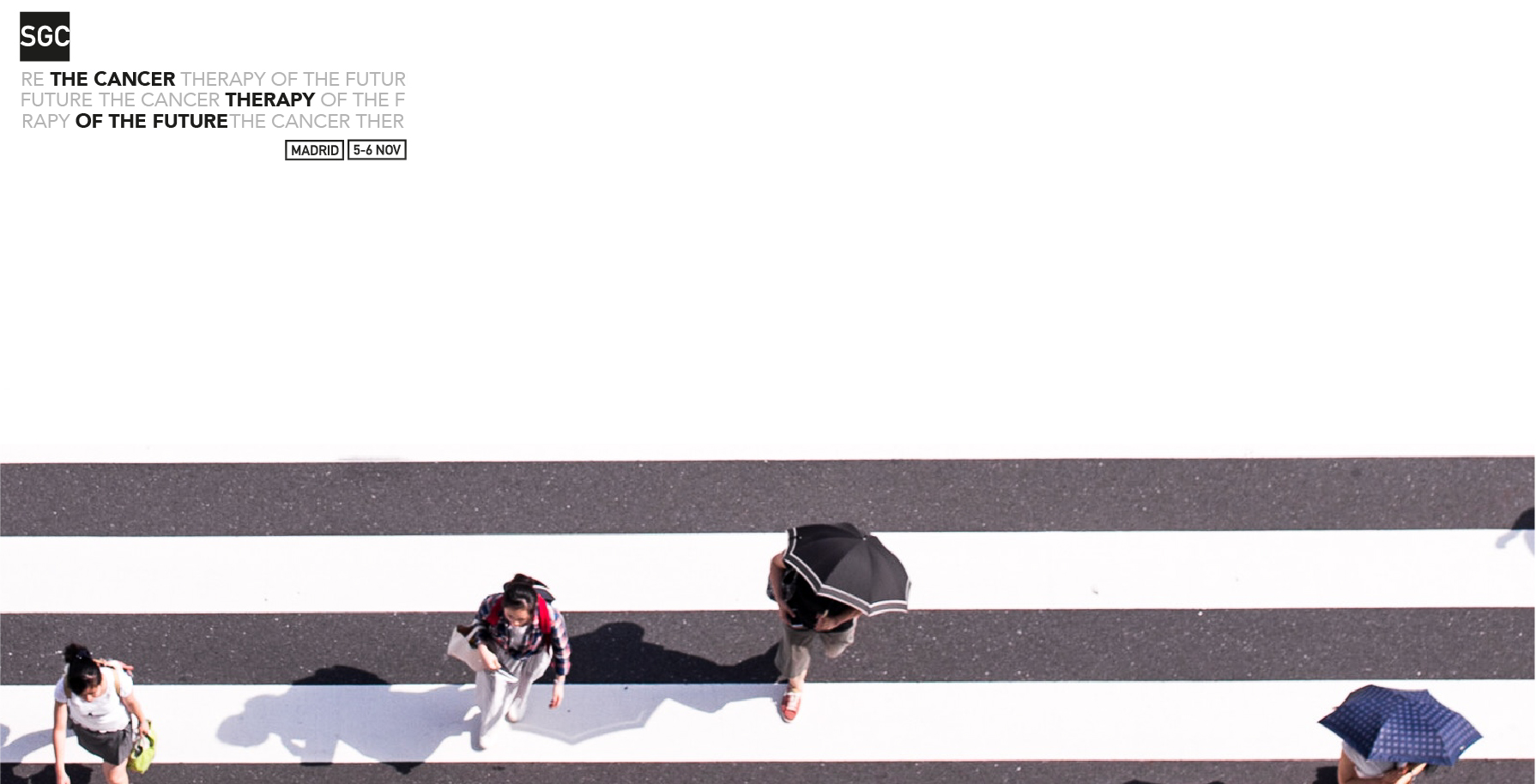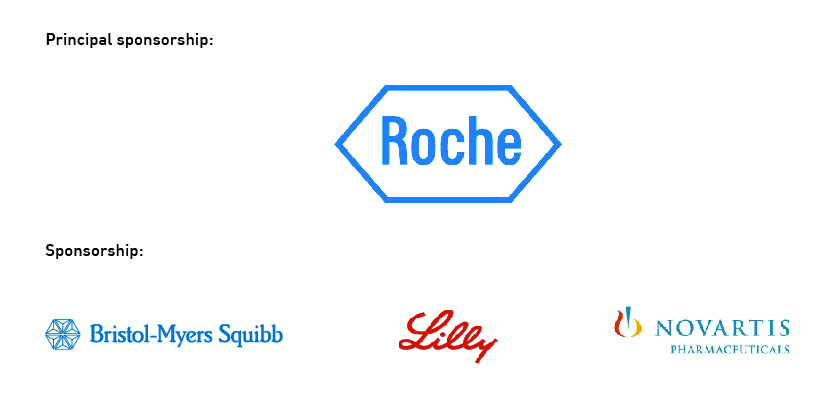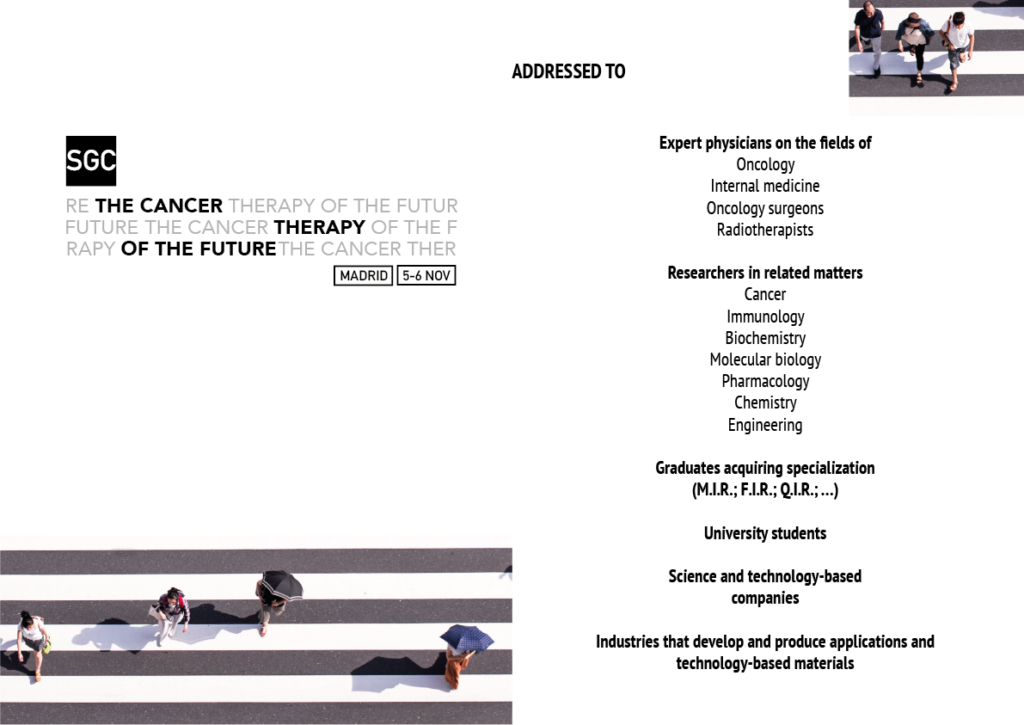
SGC «The Cancer Therapy of the Future: precision medicine versus immunotherapy»
The Gadea for Science Foundation (GSF), aware of the need for the latest advances in each of the Areas of Knowledge, includes among its activities the Organization of symposia and meetings of specific scientific content. Thus, in a global environment of increased competitiveness and demand, and promoted and organized from the Area of Knowledge of Medicina, the GSF presents its second Scientific Symposium on the theme “The Cancer therapy of the future: precision medicine versus immunotherapy”.The hope of precision medicine is that treatments will one day be tailored to the genetic changes in each person’s cancer. Currently, if a patient need treatment for cancer, he may receive a combination of treatments, including surgery, chemotherapy, radiation therapy, and immunotherapy. Which treatments each patient receive usually will depend on the type of cancer, its size, and whether it has spread. With precision medicine, information about genetic changes in each tumor can help decide which treatment will work best.

[helping_hand_ec_tabs] [helping_hand_ec_tab title=»More info»] Even though researchers are making progress every day, the precision medicine approach to cancer treatment is not yet part of routine care for most patients. Many new treatments designed to target a specific change are being tested right now in precision medicine clinical trials. Some clinical trials are accepting patients with specific types and stages of cancer. Others accept patients with a variety of cancer types and stages. To be eligible for precision medicine trials, patient’s tumor must have a genetic change that can be targeted by a treatment being tested.
The development of new biotechnologies and their application to precision medicine in cancer treatment is a fast-moving field. Understanding molecular alterations, their mechanisms of action and how they can apply to therapy is a challenge in medical oncology and clinical practice.
Research has resulted in exciting new developments in both understanding immune function and developing novel therapies. Advances in development works include the application of mass cytometry and high-throughput sequencing for evaluating cellular function and responses and the translation of important concepts to the clinic in promising early phase clinical trials.
Now we are on the way of trying to understand the nature of the immune system and its response to malignancies and to explore auto- and allo-immune responses to cancer with the goal of enabling the discovery and development of more effective anti-tumor immunotherapy.
These goals will be achieved by fostering collaborative research, advancing the latest technologies to probe immunological mechanisms, and by enhancing the infrastructure for clinical translation.
Through this Symposium we bet for better understanding the basics of tumour immunology; to learn about the fundaments of immunotherapies and their present indications in cancer treatment; and to know the state of the art on development and clinical experience of immunotherapy in different tumour types.
The development of new biotechnologies and their application to precision medicine in cancer treatment is a fast-moving field. Understanding molecular alterations, their mechanisms of action and how they can apply to therapy persists as a challenge in medical oncology and clinical practice.
This symposium is the second of a series organized by Fundación Gadea for Science, www.gadeaciencia.org , a new institution whose objective is to contribute to the improvement and advancement of the Spanish System of Science, Technology and Innovation, with special attention to the role of researchers, universities and companies. [/helping_hand_ec_tab][helping_hand_ec_tab title=»Addressed to»] [/helping_hand_ec_tab][helping_hand_ec_tab title=»Framework & Calendar»]
[/helping_hand_ec_tab][helping_hand_ec_tab title=»Framework & Calendar»]
The second GADEA Scientific Symposium: «The Cancer therapy of the future: precision medicine versus immunotherapy», will be held on November 5th and 6th, 2018, at the Hospital Ramón y Cajal auditorium, Ctra. Colmenar Viejo, km. 9, 100, 28034 Madrid, in morning and afternoon sessions. (Download program)
For those who wish to present their work or experiences, Poster Sessions are foreseen. To this purpose, please remember that limit date for sending the abstracts is October 21st, 2018. All attendees will receive an attendance certificate.
[/helping_hand_ec_tab][helping_hand_ec_tab title=»Program»]Monday, Nov 5th
9:15 Welcome
– Juan José Equiza (Gerente HURyC)
– Fernando Tejerina (Pres FGC)
– José A. Gutiérrez-Fuentes (Dir FGC)
– Mariano Barbacid
– Jesús García-Foncillas
________________________________________
9:30 OPENING CONFERENCE
Chair: José A. Gutiérrez-Fuentes
GADEA for Science Foundation. Madrid, Spain
Salvador Moncada
Cancer Domain, School of Medical Sciences, Manchester Cancer Research Centre, The University of Manchester. Manchester, UK
The indisputable case for working on the prevention and early detection of Cancer
10:15 Plenary Session I
PRECLINICAL MODELS 1
Chair: Mariano Barbacid
Molecular Oncology Programme, Spanish National Cancer Research Center (CNIO), Madrid, Spain
Gerard Evan
Department of Biochemistry, University of Cambridge. Cambridge UK. Cancer Research UK
Where cancer phenotypes come from and how to make them go away
Eduard Batlle
Oncology Programme, Institute for Research in Biomedicine (IRB), Barcelona, Spain
Immune evasion and metastasis in colorectal cancer
________________________________________
11:45 Coffee Break
________________________________________
12:15 Plenary Session II
PRECLINICAL MODELS 2
Chair: Jesús García-Foncillas
Translational Oncology Division, OncoHealth Institute, University Hospital Fundación Jiménez Díaz, UAM, Madrid, Spain.
Mariano Barbacid
Molecular Oncology Programme, Spanish National Cancer Research Center (CNIO), Madrid, Spain
Precision Medicine and K-RAS mutant cancer
Peter Carmeliet
VIB-KULeuven Center for Cancer Biology (CCB). University of Leuven, Brussels, Belgium
Angiogenesis revisited: Role and (therapeutic) implication of endothelial metabolism
________________________________________
13:45 Poster Session I and Lunch (buffet)
________________________________________
15:30 Plenary Session III
PRECISION MEDICINE 1
Chair: Alfredo Carrato
Department of Medical Oncology, Ramon y Cajal University Hospital and Health Research Institute IRYCIS, Madrid, Spain
Erwin Wagner
Cancer Cell Biology Programme. Genes, Development and Disease Group, National Cancer Research Center (CNIO), Madrid, Spain
Role of Inflammation in Mouse Models of Cancer
Ignacio Melero
Department of Inmunology, Center for Applied Medical Research (CIMA), Clinica Universitaria de Navarra, Pamplona, Spain
Costimulation, coinhibition and crosspresentation: Three crucial «Cs» for cancer immunology and immunotherapy
________________________________________
17:00 Coffee Break
________________________________________
17:30 Plenary Session IV
PRECISION MEDICINE 2
Chair: Alfredo Carrato
Sara Ghorashian
Developmental Biology and Cancer Programme, UCL Great Ormond St. Institute of Child Health. London, UK
CD19 CAR T Cell therapy for paediatric ALL
Jos Jonkers
Molecular Experimental Oncogenetics and Cancer Therapeutics, Division of Molecular Pathology, The Netherlands Cancer Institute, Amsterdam (NCI), The Netherlands
Identification of breast cancer drivers and therapy resistance mechanisms in mouse models
________________________________________
19:00 Closure
________________________________________
Tuesday, Nov 6th
9:15Plenary Session V
PRECISION MEDICINE 3
Chair: Emilio Alba
Medical Oncology Unit, Regional University Hospital Virgen de la Victoria, IBIMA, Malaga, Spain
Philippe Aftimos
Jules Bordet Institute, Clinique d’oncologie médicale, Clinical Trials Conduct Unit (CTCU). Brussels, Belgium
Precision Medicine in metastatic breast cancer: insights from the AURORA molecular screening program
Giorgio Trinchieri
Cancer Immunobiology Section, Center for Cancer Research, National Cancer Institute, Bethesda, MD, USA
Role of the microbiota in carcinogenesis and cancer therapy
________________________________________
10:45Coffee Break
________________________________________
11:15Plenary Session VI
IMMUNOTHERAPY 1
Chair: José Alberto Orfao
Department of Medicine and Cytometry Service, University of Salamanca, Salamanca, Spain
Luis Álvarez-Vallina
Engineering – Cell engineering, Aarhus University. LeadArtis. Aarhus C, Denmark.
Redirecting T cells for Cancer Therapy
Lorenzo Galluzzi
Department of Radiation Oncology, Weill Cornell Medical College, New York, NY, USA
Luis Paz-Ares
Medical Oncology Department, University Hospital 12 de Octubre, Madrid, Spain
Personalized immunotherapy in Lung Cancer
________________________________________
13:30Poster Session II and Lunch (buffet)
________________________________________
15:30 Plenary Session VII
IMMUNOTHERAPY 2
Chair: Luis Paz-Ares
Medical Oncology Department, University Hospital 12 de Octubre, Madrid, Spain
Kris Thielemans
Laboratory of Molecular and Cellular Therapy, Vrije Universiteit Brussel, Brussels, Belgium
mRNA Therapeutics: ex-vivo and in-vivo modification of antigen presenting cells
Sonia Guedan
Institut d’investigacions Biomèdiques August Pi i Sunyer (IDIBAPS), Barcelona, Spain
Genetically modified T cells for the treatment of cancer
Bertrand Routy
Hemato-Oncology Centre Hospitalier de l’Université de Montréal (CHUM), Canada
Latest data on the link between the gut microbiota to immune checkpoint inhibitors
________________________________________
17:45 Closure and farewell
[/helping_hand_ec_tab][helping_hand_ec_tab title=»Posters»]Posters submission:
– Deadline for applications/ abstracts delivery: October 21st, 2018
– Extension: No more than 400 total words
– Send to: fundacion@gadeaciencia.org
– Official language: English
___________________
Recommended format:
Title of the presentation
First Author (speaker)
Affiliation, first.author@email.com
Second Author
Affiliation, second.author@email.com
Third Author
Affiliation, third.author@email.com
Abstract
Abstracts extension: one / two pages (400 words limit)
Bibliography is optional. Please, use the following format [1] for bibliography references.
Keywords: no more than six.
[1] Surname1, N., Surname2, N. (year) Paper title. Journal Title, volume, pages.
[/helping_hand_ec_tab][helping_hand_ec_tab title=»Registration»]
To apply for admission in the second Gadea Symposium, you must complete the application form at our web page.
The registration price is 250€. It includes academic sessions, printed materials, lunches and coffees.
Registration for all specialists will be free.
– Expert physicians on the fields of: Oncology, Internal medicine, Oncology surgeons, Radiotherapists
– Researchers in related matters: Cancer, Immunology, Biochemistry, Molecular biology, Pharmacology, Chemistry, Engineering
– Graduates acquiring specialization (M.I.R.; F.I.R.; Q.I.R.; …)
– Posters Authors
(Limited capacity)
[helping_hand_ec_button url=»http://gadeaciencia.org/inscripciones/» style=»grey» size=»medium» type=»round» target=»_self»] Registration [/helping_hand_ec_button]
[/helping_hand_ec_tab] [/helping_hand_ec_tabs]
Agenda
| L | M | X | J | V | S | D |
|---|---|---|---|---|---|---|
| 1 | 2 | 3 | 4 | 5 | 6 | |
| 7 | 8 | 9 | 10 | 11 | 12 | 13 |
| 14 | 15 | 16 | 17 | 18 | 19 | 20 |
| 21 | 22 | 23 | 24 | 25 | 26 | 27 |
| 28 | 29 | 30 | 31 | |||
Entradas recientes
Archivos
- marzo 2025
- enero 2025
- febrero 2024
- septiembre 2023
- julio 2023
- marzo 2023
- febrero 2023
- enero 2023
- noviembre 2022
- octubre 2022
- junio 2021
- diciembre 2020
- noviembre 2020
- octubre 2020
- septiembre 2020
- julio 2020
- junio 2020
- mayo 2020
- abril 2020
- marzo 2020
- febrero 2020
- enero 2020
- noviembre 2019
- septiembre 2019
- julio 2019
- junio 2019
- mayo 2019
- abril 2019
- marzo 2019
- febrero 2019
- enero 2019
- diciembre 2018
- octubre 2018
- septiembre 2018
- julio 2018
- junio 2018
- marzo 2018
- febrero 2018
- octubre 2017
- agosto 2017
- mayo 2017


Comentarios recientes